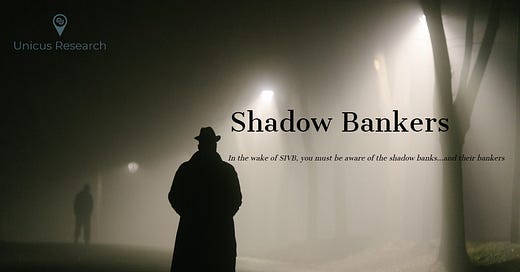These bankers are not on the regulator’s radar- yet, lurking deep in the shadows and weaving themselves into the commercial banks. According to the regulators, these bankers are unregulated, out of control, and dangerous to our economy.
If you have not yet signed up for us, it is time to sign up for our subscription.
What is Shadow Banking?
Many financial institutions that “act” like banks are not supervised like banks. They are referred to as “Shadow Bankers.”
The term Shadow banking is broad and lacks a clear definition.
A strict definition of ‘shadow banking’ includes all financial institutions that carry out credit intermediation, such as collective investment vehicles, broker-dealers, and structured finance vehicles.
A broader definition is Shadow Banker encompasses all non-bank financial institutions involved in lending: insurance firms, mutual funds, hedge funds, payday lending services, pension funds, money market funds, corporate treasury lending, currency exchanges, buy now pay later, and microloan organizations.
Why it is called “Shadow” Banking?
The term “shadow bank” was coined by economist Paul McCulley in a 2007 speech at the annual financial symposium hosted by the Kansas City Federal Reserve Bank in Jackson Hole, Wyoming.1
Who are “Shadow Bankers”?
In McCulley’s talk, shadow banking had a distinctly US focus and referred mainly to nonbank financial institutions engaged in what economists call maturity transformation. Commercial banks engage in maturity transformation when they use deposits, which are normally short-term, to fund longer-term loans. Shadow banks do something similar. They raise (that is, mostly borrow) short-term funds in the money markets and use those funds to buy assets with longer-term maturities. But because they are not subject to traditional bank regulation, they cannot—as banks can—borrow in an emergency from the Federal Reserve (the US central bank) and do not have traditional depositors whose funds are covered by insurance; they are in the “shadows.”2
Why Now?
The past month has been an adrenaline rush for investors and the general public. The sudden demise of Silicon Valley Bank (SIVB) must send chills through the spine of regulators, not because of SIVB and SBNY, but because the unregulated, uncontrollable weed of shadow bankers are more dangerous and are lurking in the shadows — they threaten the existence of the global economy.



